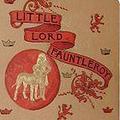Chapter 2 (3)
His conversation with Mr. Hobbs was a long and serious one. Once having got over the first shock, Mr. Hobbs was not so rancorous as might have been expected; he endeavored to resign himself to the situation, and before the interview was at an end he had asked a great many questions. As Cedric could answer but few of them, he endeavored to answer them himself, and, being fairly launched on the subject of earls and marquises and lordly estates, explained many things in a way which would probably have astonished Mr. Havisham, could that gentleman have heard it.
But then there were many things which astonished Mr. Havisham. He had spent all his life in England, and was not accustomed to American people and American habits. He had been connected professionally with the family of the Earl of Dorincourt for nearly forty years, and he knew all about its grand estates and its great wealth and importance; and, in a cold, business-like way, he felt an interest in this little boy, who, in the future, was to be the master and owner of them all,--the future Earl of Dorincourt. He had known all about the old Earl's disappointment in his elder sons and all about his fierce rage at Captain Cedric's American marriage, and he knew how he still hated the gentle little widow and would not speak of her except with bitter and cruel words. He insisted that she was only a common American girl, who had entrapped his son into marrying her because she knew he was an earl's son. The old lawyer himself had more than half believed this was all true. He had seen a great many selfish, mercenary people in his life, and he had not a good opinion of Americans. When he had been driven into the cheap street, and his coupe had stopped before the cheap, small house, he had felt actually shocked. It seemed really quite dreadful to think that the future owner of Dorincourt Castle and Wyndham Towers and Chorlworth, and all the other stately splendors, should have been born and brought up in an insignificant house in a street with a sort of green-grocery at the corner. He wondered what kind of a child he would be, and what kind of a mother he had. He rather shrank from seeing them both. He had a sort of pride in the noble family whose legal affairs he had conducted so long, and it would have annoyed him very much to have found himself obliged to manage a woman who would seem to him a vulgar, money-loving person, with no respect for her dead husband's country and the dignity of his name. It was a very old name and a very splendid one, and Mr. Havisham had a great respect for it himself, though he was only a cold, keen, business-like old lawyer.
When Mary handed him into the small parlor, he looked around it critically. It was plainly furnished, but it had a home-like look; there were no cheap, common ornaments, and no cheap, gaudy pictures; the few adornments on the walls were in good taste. and about the room were many pretty things which a woman's hand might have made. "Not at all bad so far," he had said to himself; "but perhaps the Captain's taste predominated." But when Mrs. Errol came into the room, he began to think she herself might have had something to do with it. If he had not been quite a self-contained and stiff old gentleman, he would probably have started when he saw her. She looked, in the simple black dress, fitting closely to her slender figure, more like a young girl than the mother of a boy of seven. She had a pretty, sorrowful, young face, and a very tender, innocent look in her large brown eyes,--the sorrowful look that had never quite left her face since her husband had died. Cedric was used to seeing it there; the only times he had ever seen it fade out had been when he was playing with her or talking to her, and had said some old-fashioned thing, or used some long word he had picked up out of the newspapers or in his conversations with Mr. Hobbs. He was fond of using long words, and he was always pleased when they made her laugh, though he could not understand why they were laughable; they were quite serious matters with him. The lawyer's experience taught him to read people's characters very shrewdly, and as soon as he saw Cedric's mother he knew that the old Earl had made a great mistake in thinking her a vulgar, mercenary woman. Mr. Havisham had never been married, he had never even been in love, but he divined that this pretty young creature with the sweet voice and sad eyes had married Captain Errol only because she loved him with all her affectionate heart, and that she had never once thought it an advantage that he was an earl's son. And he saw he should have no trouble with her, and he began to feel that perhaps little Lord Fauntleroy might not be such a trial to his noble family, after all. The Captain had been a handsome fellow, and the young mother was very pretty, and perhaps the boy might be well enough to look at.

